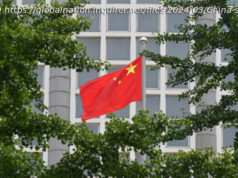Let us help you start your day.
(Want to get this briefing by email? Here’s the sign-up .)
Good morning.
We’ll be off on Monday for the American holiday of Martin Luther King Day.
Now back to the news: America’s expanded antimissile efforts, China’s shrinking population, and the economic costs of climate change .
President Trump announced new investments in missile defenses aimed at shielding the nation against growing threats from North Korea, China, Russia and Iran.
“Our goal is simple: to ensure that we can detect and destroy any missile launched against the United States anywhere, any time, any place,” Mr. Trump said at the Pentagon.
Background: Antimissile systems are extremely costly — the U. S. has spent over $300 billion on them to date — and also extremely difficult to get right. It has proved challenging to intercept speeding targets in the sky: A system introduced in 2004 has failed in 50 percent of tests.
Timing: The announcement came a day before Vice President Mike Pence is scheduled to meet with North Korea’s lead nuclear program negotiator, Kim Yong-chol, in Washington. Earlier this week, Mr. Pence said the U. S. was still waiting for “concrete steps from North Korea” toward denuclearization — a demand that has so far stalled dialogue between the two countries.
Chinese academics recently issued a stark warning: The country is facing its most precipitous population decline in decades, a trend that could have far-reaching economic and political consequences.
Details: Preliminary numbers suggest the total number of births in China in 2018 could fall to 15 million, down from 17.2 million in 2017. Women need to have 2.1 children to maintain population levels — but the official fertility rate is currently 1.6 children per women, and even that number is disputed.
Given this trajectory, the academics estimated that the country’s population could start shrinking in 2027. And some experts believe that could come sooner or has already begun.
One of the main reasons for the trend was long-term consequences from China’s “one child” policy to slow population growth, experts said. The policy also created gender imbalances.
Why it matters: With fewer workers in the future, the government could struggle to pay for a population that is growing older and living longer.
The prime minister has to return to Parliament by Monday with an updated blueprint for Britain’s withdrawal from the E. U. That plan is then scheduled to go to a vote on Jan. 29 .
Days after Parliament resoundingly rejected her initial Brexit plan, she invited opposition party leaders to discuss a compromise. But the opposition leader, Jeremy Corbyn, asked her first to rule out a “no-deal” exit. Mrs. May rejected the demand as an “impossible condition.






